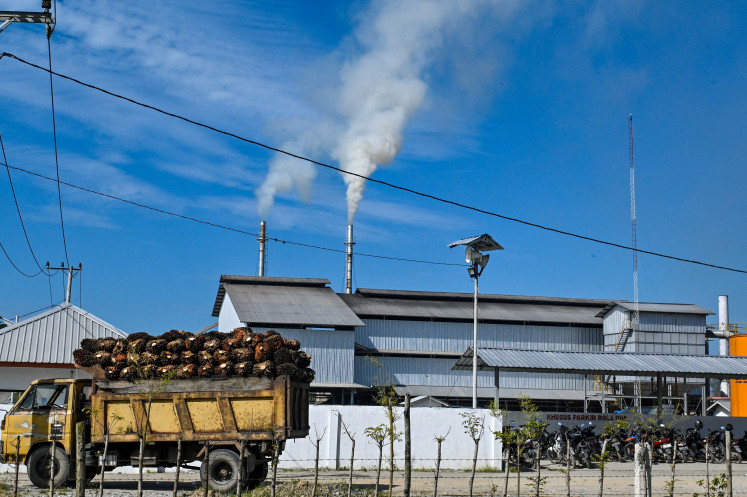Popular Reads
Top Results
Can't find what you're looking for?
View all search resultsPopular Reads
Top Results
Can't find what you're looking for?
View all search resultsIn search of 'just health'
It was my first time reading a book of this kind
Change text size
Gift Premium Articles
to Anyone
I
t was my first time reading a book of this kind. Just Health is written by Harvard School of Public Health professor and philosopher Norman Daniels. In the book, Daniels lays out his 'integrated theory of justice and population health' that extends Rawls' theory of justice as fairness on population health. That is, a liberal egalitarian view of what justice requires for a population's health.
Daniels' book may be relevant to Indonesia's current health affairs.
Among the biggest hurdles in initiating Indonesia's national health insurance (JKN) was getting the government to agree on the premium for the poor, the beneficiaries of premium subsidy (PBI). The PBI premium was agreed at Rp 19,225 (just over US$1.50) per person per month, which is far below the 'economic price' of covered services.
Simply put, the JKN may not be financially sustainable unless the government pours more money into it to increase the PBI premium. However, sooner than later, we will come to realize that money and other resources are limited and will not suffice to cover all the services that need to be covered.
What services should we prioritize then? Here is where the idea that should prevail.
Now imagine a box, its length, width and depth define its volume. Imagine we want to make a box with a certain volume, say a cubic meter, how would we make it? Would we prefer to make all the dimensions equal, such that we would have a cube? Or would we make it so thin than we basically just have a plate? Or would we prefer some other dimension, and for what reason?
That box represents the idea of universal health coverage, such as our JKN. Its length represents the number of people covered, its width the services and its depth the payment amount for each service. The volume is the premium pool.
The World Health Organization, by the way, uses this analogy.
Ideally, we would have a box so big that it covers everyone for everything. But we will never have that. The JKN box, to me, seems like a matchbox; sufficiently long and wide, nonetheless very thin. But whether or not the JKN box has the right dimensions is a question of justice.
Adjusting the dimensions of the JKN box involves rationing, controlling the distribution of resources. Because those resources, the box's volume, are limited, we can never increase one dimension without decreasing another.
'How can we meet health needs fairly when we can't meet them all?' is one of the questions Daniels attempts to answer in his book.
Daniels rejects utilitarian aggregation such that resources are distributed for the greatest good for the greatest number. Assuming Rawls' justice as fairness, Daniels asserts that a wide array of public health and medical services are necessary to promote equal opportunity and that such a system must prioritize the worst-off in society. He then supplements his general theory by a fair procedure of rationing that will lead to a fair, and thus just, outcome.
So how are we going to decide whether the JKN distributes resources justly?
Unfortunately, in spite of our progress of reforming healthcare financing in Indonesia, I found little reference to our idealization of 'social justice for all people of Indonesia' has been made. For example, although Law No. 40/2004 on national social security system (SJSN) and Law No. 24/2011 on the Social Security Management Agency (BPJS) explicitly state the principle of social justice, they further explain it simply as 'an ideal principle'.
That is not helpful.
Reading Daniels, perhaps like Rawls, we as a nation have largely excluded health from our notion of social justice. Perhaps for us a just distribution of health, as a part of social welfare, has been taken for granted.
I think we need to extend our idea of social justice to health. Like 'demokrasi Pancasila' or Pancasila-based democracy and 'ekonomi Pancasila', both often juxtaposed against 'liberal democracy' and 'liberal economy', we may need to define what 'kesehatan Pancasila' is. Just like Daniels extends Rawls to health.
Having a detailed account of a just distribution of health can help us solve some of the rationing problems that arise with the JKN. It is not necessarily sufficient to resolve those problems, but what is more important is that it will make our moral, and other, choices for rationing resources for health explicit. Surely that will help explain why some services are covered while others are not.
And then we may have just, morally just, health. Not just, only, health.
The writer is a lecturer at Padjadjaran University's School of Medicine, Bandung. He is now pursuing a doctorate of science at the Harvard School of Public Health in Boston, Massachusetts.










